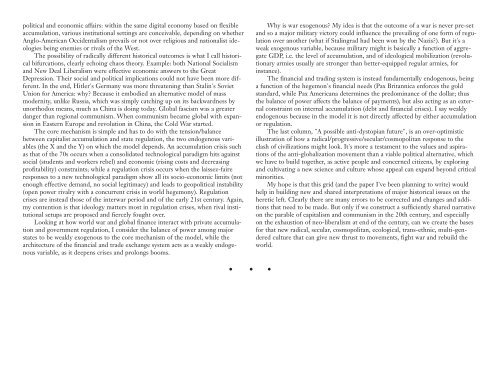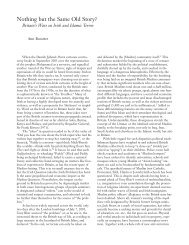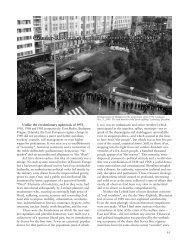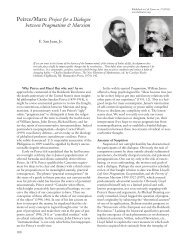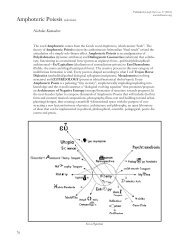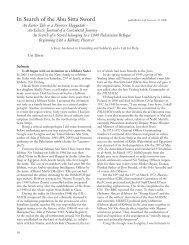Alex Foti: The Grid & the Fork - Left Curve
Alex Foti: The Grid & the Fork - Left Curve
Alex Foti: The Grid & the Fork - Left Curve
- No tags were found...
You also want an ePaper? Increase the reach of your titles
YUMPU automatically turns print PDFs into web optimized ePapers that Google loves.
political and economic affairs: within <strong>the</strong> same digital economy based on flexible<br />
accumulation, various institutional settings are conceivable, depending on whe<strong>the</strong>r<br />
Anglo-American Occidentalism prevails or not over religious and nationalist ideologies<br />
being enemies or rivals of <strong>the</strong> West.<br />
<strong>The</strong> possibility of radically different historical outcomes is what I call historical<br />
bifurcations, clearly echoing chaos <strong>the</strong>ory. Example: both National Socialism<br />
and New Deal Liberalism were effective economic answers to <strong>the</strong> Great<br />
Depression. <strong>The</strong>ir social and political implications could not have been more different.<br />
In <strong>the</strong> end, Hitler's Germany was more threatening than Stalin's Soviet<br />
Union for America: why Because it embodied an alternative model of mass<br />
modernity, unlike Russia, which was simply catching up on its backwardness by<br />
unorthodox means, much as China is doing today. Global fascism was a greater<br />
danger than regional communism. When communism became global with expansion<br />
in Eastern Europe and revolution in China, <strong>the</strong> Cold War started.<br />
<strong>The</strong> core mechanism is simple and has to do with <strong>the</strong> tension/balance<br />
between capitalist accumulation and state regulation, <strong>the</strong> two endogenous variables<br />
(<strong>the</strong> X and <strong>the</strong> Y) on which <strong>the</strong> model depends. An accumulation crisis such<br />
as that of <strong>the</strong> 70s occurs when a consolidated technological paradigm hits against<br />
social (students and workers rebel) and economic (rising costs and decreasing<br />
profitability) constraints; while a regulation crisis occurs when <strong>the</strong> laissez-faire<br />
responses to a new technological paradigm show all its socio-economic limits (not<br />
enough effective demand, no social legitimacy) and leads to geopolitical instability<br />
(open power rivalry with a concurrent crisis in world hegemony). Regulation<br />
crises are instead those of <strong>the</strong> interwar period and of <strong>the</strong> early 21st century. Again,<br />
my contention is that ideology matters most in regulation crises, when rival institutional<br />
setups are proposed and fiercely fought over.<br />
Looking at how world war and global finance interact with private accumulation<br />
and government regulation, I consider <strong>the</strong> balance of power among major<br />
states to be weakly exogenous to <strong>the</strong> core mechanism of <strong>the</strong> model, while <strong>the</strong><br />
architecture of <strong>the</strong> financial and trade exchange system acts as a weakly endogenous<br />
variable, as it deepens crises and prolongs booms.<br />
Why is war exogenous My idea is that <strong>the</strong> outcome of a war is never pre-set<br />
and so a major military victory could influence <strong>the</strong> prevailing of one form of regulation<br />
over ano<strong>the</strong>r (what if Stalingrad had been won by <strong>the</strong> Nazis). But it's a<br />
weak exogenous variable, because military might is basically a function of aggregate<br />
GDP, i.e. <strong>the</strong> level of accumulation, and of ideological mobilization (revolutionary<br />
armies usually are stronger than better-equipped regular armies, for<br />
instance).<br />
<strong>The</strong> financial and trading system is instead fundamentally endogenous, being<br />
a function of <strong>the</strong> hegemon's financial needs (Pax Britannica enforces <strong>the</strong> gold<br />
standard, while Pax Americana determines <strong>the</strong> predominance of <strong>the</strong> dollar; thus<br />
<strong>the</strong> balance of power affects <strong>the</strong> balance of payments), but also acting as an external<br />
constraint on internal accumulation (debt and financial crises). I say weakly<br />
endogenous because in <strong>the</strong> model it is not directly affected by ei<strong>the</strong>r accumulation<br />
or regulation.<br />
<strong>The</strong> last column, "A possible anti-dystopian future", is an over-optimistic<br />
illustration of how a radical/progressive/secular/cosmopolitan response to <strong>the</strong><br />
clash of civilizations might look. It's more a testament to <strong>the</strong> values and aspirations<br />
of <strong>the</strong> anti-globalization movement than a viable political alternative, which<br />
we have to build toge<strong>the</strong>r, as active people and concerned citizens, by exploring<br />
and cultivating a new science and culture whose appeal can expand beyond critical<br />
minorities.<br />
My hope is that this grid (and <strong>the</strong> paper I've been planning to write) would<br />
help in building new and shared interpretations of major historical issues on <strong>the</strong><br />
heretic left. Clearly <strong>the</strong>re are many errors to be corrected and changes and additions<br />
that need to be made. But only if we construct a sufficiently shared narrative<br />
on <strong>the</strong> parable of capitalism and communism in <strong>the</strong> 20th century, and especially<br />
on <strong>the</strong> exhaustion of neo-liberalism at end of <strong>the</strong> century, can we create <strong>the</strong> bases<br />
for that new radical, secular, cosmopolitan, ecological, trans-ethnic, multi-gendered<br />
culture that can give new thrust to movements, fight war and rebuild <strong>the</strong><br />
world.<br />
• • •


